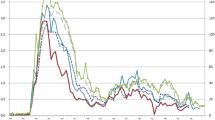Abstract
Many countries used short-time working arrangements (STWAs) as a response to the Great Recession of 2008–2009. STWAs are designed to protect jobs during short-term downturns by adjusting the work durations of employees. We study STWAs in France between 2007 and 2010. The objective of this paper is to describe the main characteristics of firms and employees operating under STWAs by using firm-level STW data sets and the French Labor Force Survey.



Similar content being viewed by others
Notes
See, for example, the recent paper of Arpaia et al. (2010) describing STWA in European Union countries. For a description of STW in the United States, see Vroman and Brusentsev (2009).
For more details on the regulation of STWA in France, see Chagny (2010) and Riso (2010).
French territorial division.
After using STW, employers must address monthly a request for compensation to the French administration indicating the amount to be reimbursed. If the firm does not comply with these procedures, the employer must pay ‘standard’ wages.
If an employee is on STW more than 6 consecutive weeks, we call this situation ‘total STW’. At this point, the work contract ends.
The STW compensation is exempt from employer social contribution taxes, but is subjected to the supplementary social security contribution (CSG) and to the contribution to the repayment of the social security debt (CRDS).
There is another complementary allocation that guarantees employees a minimum legal monthly remuneration equal to the net level of the minimum wage (Smic). Since 1 January 2010, employees must receive at least €6.96 net per hour (temporary workers, apprentices, part-time employees are not concerned). When an APLD agreement is concluded the amount of money given to employees cannot be less than the minimum legal monthly remuneration.
For example, for a STW agreement with a rate of 100% for a firm with more than 250 employees, for each hour of STW, the State pays €3.33 for the STW specific allocation and €3.51 for the complementary allocation related to the STW agreement (3.33+3.51=€6.84).
An APLD agreement is concluded between a professional or an inter-professional organization or a firm and the Ministry of Employment, the prefect or the head of the French administration at the department level (Unité territoriale). Agreements could be concluded at a national, regional or departmental level, and firms can easily subscribe by filling in a subscription form.
For example, a firm that has <250 employees and which puts them on STW for 40 hours and it is covered by an APLD agreement, will receive from the State €3.84 per hour for the specific STW allocation and €1.90 per hour for the APLD allocation.
More precisely, files provide establishment-level data. In France, a firm may have several establishments.
Data also indicate whether STW authorizations took place within an APLD agreement. This information was not used here as its quality remains to be proven.
The Statistical Department of the French Ministry of Labor (DARES) presents monthly information on STW authorizations. See http://www.travail-emploi-sante.gouv.fr/etudes-recherche-statistiques-de,76/statistiques,78/chomage,79/les-series-statistiques,265/les-series-mensuelles-de-l,11788.html.
The part of France located in Europe.
References
Abraham, K and Houseman, S . 1994: Does employment protection inhibit labor market flexibility? Lessons from Germany, France, and Belgium. In: Blank, R (ed). Social Protection Versus Economic Flexibility: Is there a Tradeoff? University of Chicago Press: Chicago.
Arpaia, A, Curci, N, Meyermans, E, Peschner, J and Pierini, F . 2010: Short time working arrangements as response to cyclical fluctuations Occasional Papers of the European Commission no. 64, June.
Boeri, T and Bruecker, H . 2011: Short-time work benefits revisited: Some lessons from the Great Recession. Economic Policy 26 (68): 697–765.
Burdett, K and Wright, R . 1989: Unemployment insurance and short-term compensation: The effects of layoffs, hours per worker, and wages. The Journal of Political Economy 97 (6): 1479–1496.
Cahuc, P and Carcillo, S . 2011: Is short-time work a good method to keep unemployment down? Nordic Economic Policy Review 1 (1): 133–169.
Calavrezo, O . 2009: Entre flexibilité et sécurité: l’accompagnement des entreprises et des mobilités professionnelles. Essais empiriques de microéconométrie du marché du travail. PhD Dissertation, University of Orleans.
Calavrezo, O, Duhautois, R and Walkowiak, E . 2009a: The substitution of worksharing and short-time compensation in France: A difference-in-differences approach. Economics Bulletin 29 (2): 821–834.
Calavrezo, O, Duhautois, R and Walkowiak, E . 2009b: The short-time compensation program in France: An efficient measure against redundancies? CEE Working Paper no. 114, February.
Calavrezo, O, Duhautois, R and Walkowiak, E . 2010: Short-time compensation and establishment survival: An empirical analysis with French data IZA Discussion Paper no. 4989, June.
Chagny, O . 2010: From partial unemployment to partial activity: The story of a very typical French lady Mutual Learning Programme 23010, Autum Peer Reviews.
Gray, D . 1998: When might a distressed firm share work? Evidence from the short-time compensation programme in France. British Journal of Industrial Relations 36 (1): 43–72.
Hijzen, A and Venn, D . 2011: The role of short-time work schemes during the 2008–09 recession OECD Social, Employment and Migration Working Papers no. 115, OECD Publishing.
Riso, S . 2010: France: Partial unemployment allowance and compensation for long-term reduced activity allowance Eurofund Report, November.
Van Audenrode, MA . 1994: Short-time compensation, job security, and employment contracts: Evidence from selected OECD countries. The Journal of Political Economy 102 (1): 76–102.
Vroman, W and Brusentsev, V . 2009: Short-time compensation as a policy to stabilize employment Working Paper, University of Delaware, November.
Acknowledgements
The research reported here was conducted at the Statistical Department of the French Ministry of Labor (DARES). Helpful comments have been received from Sévane Ananian, Rozenn Desplatz and Cyril Nouveau. We would also like to thank participants in the 8th Euroframe Conference in Helsinki, as well as participants in the International Workshop ‘Crises, Institutions and Labour Market Performance: Comparing Evidence and Policies’ in Perugia and especially Fabio Aricò for his rich remarks. Any opinions expressed in this paper are those of the authors and not those of the DARES. Of course, any remaining errors and omissions remain our own responsibility.
Author information
Authors and Affiliations
Rights and permissions
About this article
Cite this article
Calavrezo, O., Lodin, F. Short-Time Working Arrangements in France During the Crisis: An Empirical Analysis of Firms and Employees. Comp Econ Stud 54, 299–320 (2012). https://doi.org/10.1057/ces.2012.14
Published:
Issue Date:
DOI: https://doi.org/10.1057/ces.2012.14




